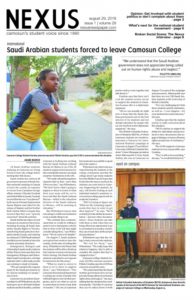Camosun’s student government is a political force made up of our own bodies. We are the people who sit down at the table with organizations like the Canadian Federation of Students (CFS) to speak as a collective voice on the things that matter most.
Camosun student affiliation with the CFS—who recently expulsed Camosun students from the CFS due to ongoing clashes between British Columbia member locals and the national organization—is linked to our ability to obtain, for example, student rights, lower tuition fees, and freedoms for marginalized students. This makes us directly responsible for being informed and making sure we get what we need in negotiations.
Without knowledge, and without participating, we cannot do this.

Yes, we paid to be a part of this organization in exchange for their advocacy on a federal level. But despite having paid for their assistance, bemoaning problems that arise from poor or mishandled relations with the CFS seems pointless—or, worse, actively detrimental—if we have taken no initiative to learn about how it affects us, no action to ensure progress. It is time to get informed.
According to Elections Canada, voter turnout was 68.3 percent in the 2015 federal election. For the 18-to-24 demographic, 57.1 percent of people showed up; that number may seem high when compared to young voter turnout of years past, but it’s barely over half of the demographic.
This means people of student age aren’t voting in the numbers they should be. Despite the fact that we are the future decision makers and politicians of the world, we’re not taking an interest in decisions or politics. That low percentage of young voters is an example of a larger problem. The next generation of leaders of this country aren’t getting involved enough, and things are falling apart.
I spoke to 10 Camosun students recently about voting in the Camosun College Student Society elections last year—only one person said they had voted. That’s a pretty small sample, so I won’t claim to have any hard data, but, to me, that number doesn’t look good. We don’t seem to care what happens to our education, our money, our country.
Almost half of us don’t vote nationally, many of us don’t vote at school—we’re not doing our due diligence in securing the future, and we’re going to pay for that out of our own pocket.
When you don’t vote or make yourself knowledgeable about how the political system works, you’re telling those in power, like the CFS, that you don’t care what happens. You’re making it clear that you won’t advocate for yourself, and you become a victim of money grabs and power games by those who benefit from your silence.
You lose control of your political voice.
If you don’t vote, lack of action also disqualifies you from the camp that has a right to complain about the problems that make your school life harder. You’ve shirked your responsibility to yourself and so you forfeit your right to moan when organizations like the CFS start behaving badly.
We are lucky enough to be students at a school where we’re allowed to influence important decisions. Despite this, we take for granted the chance to make our voices heard, and as a result we lose our ability to do so. Getting involved is essential in learning how to advocate for your rights in the wider, crueller world outside college. However, more importantly, exercising your voice ensures that you can retain the freedom and ability to speak at all.
